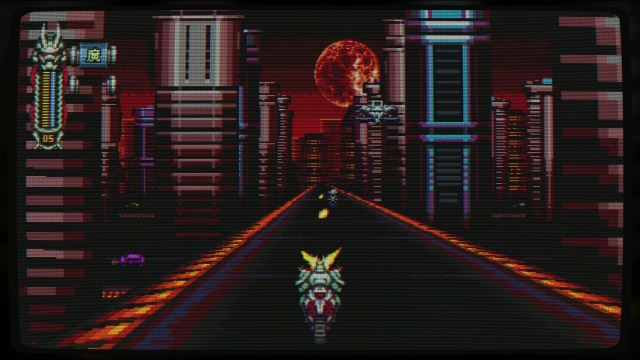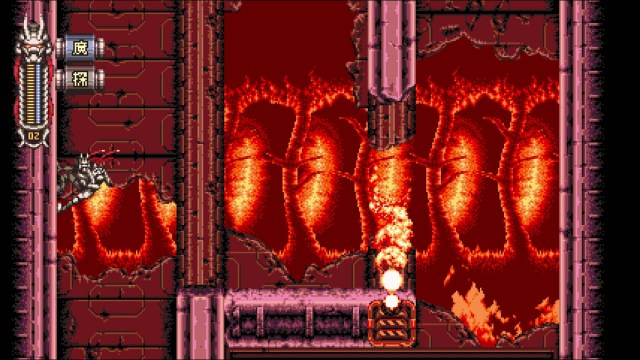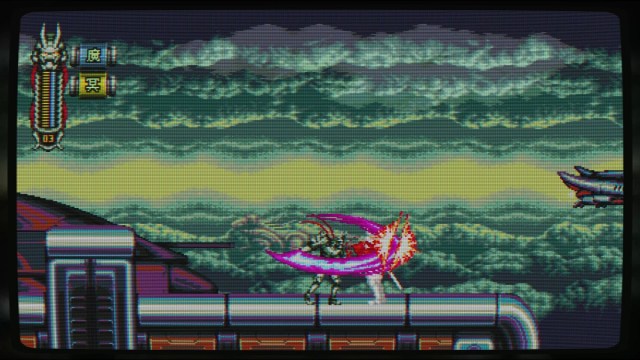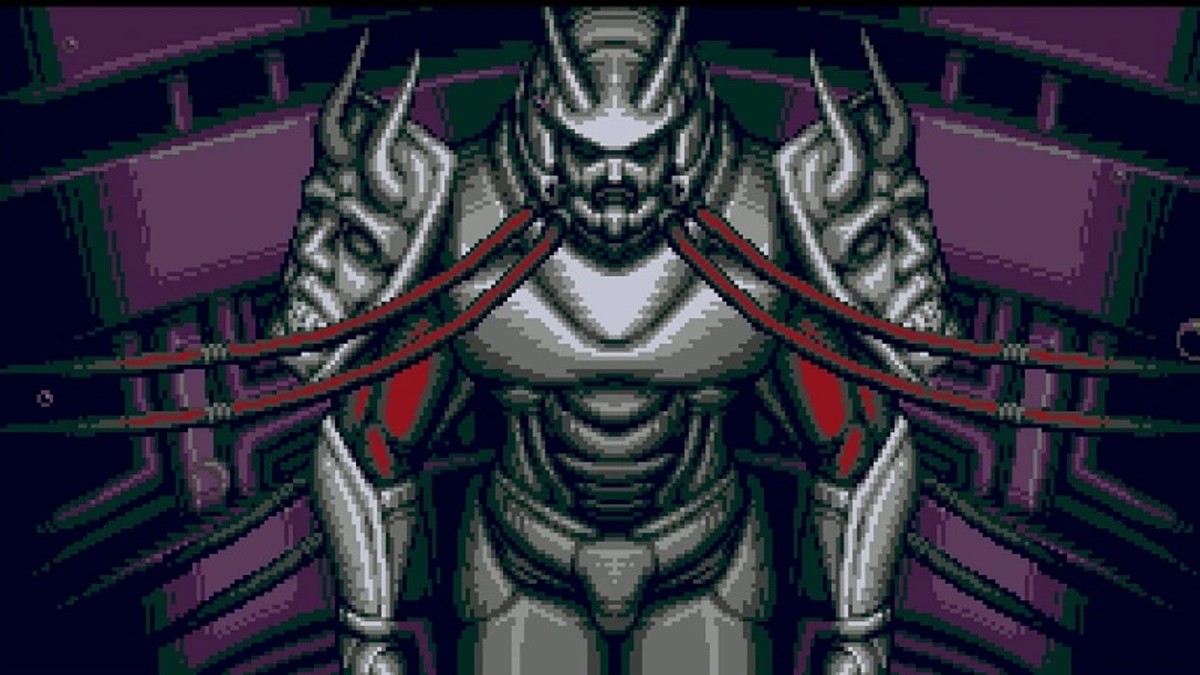Revengeance
The retro-inspired market went from novel to heavily saturated rather quickly, and now they’ve been their own corner of the industry for over a decade. It’s a rather difficult corner to stand out in. It’s a pretty busy corner.
For my money, it’s a precarious balancing act between building off designs and mechanics of the era, while also finding a memorable identity. You can make Contra again, and if you do a good job, that can be good enough. But you can’t stand with the big boys unless you bring your own pants. Or something. I sometimes just hork up analogies and hope they make sense.
With Oniken, Odallus, and Blazing Chrome under their belt, JoyMasher has tried on a few pairs of pants in their years. Really, though, those games harken rather heavily toward their influences. Vengeful Guardian: Moonrider is their latest retro-flavored attempt. Does this one bring enough of its own juice to make a delicious cocktail? Okay, I’ll stop now.

Vengeful Guardian: Moonrider (PC [Reviewed], PS4, PS5, Nintendo Switch)
Developer: Joymasher
Publisher: The Arcade Crew
Released: January 12, 2023
MSRP: $16.99
I think the best I can do to explain the retro inspiration of Vengeful Guardian: Moonrider is to say that it’s like a cross between Shinobi 3 and Mega Man X, but without the ranged combat of either title. You play as a mopey samurai Robo-Cop and your goal is to platform across a number of stages in any order, with the objective being to eliminate a boss and take their power. Cyberpunk Shinobi might be the most efficient way to describe it, Moonrider just seems like it’s more in a hurry.
That’s not to say that Vengeful Guardian: Moonrider is derivative, but you can tell from where it was influenced. And I love it. A couple of the levels even have raster racer-style intros, so it knows where my heart is.
While Oniken and Odallus were visually NES-styled and Blazing Chrome fits more as an early-’90s arcade title, Vengeful Guardian: Moonrider is decidedly more Genesis. Sega CD might be more accurate, as the music and sound don’t really adhere to the intonations of the console’s FM synth. To add to this aesthetic, the short loading between scenes is accompanied by a spinning disc logo on the corner. Just like the old days when games came on disc.
Samurai Robo-Cop
Despite the soundtrack going in its own direction, the aesthetic is extremely convincing. A lot of thought was given not just to the quality of pixel art but the restrictions that the Sega CD would present. Sprite rotation is used sparingly, and everything is animated frame-by-frame rather than using any modern shortcuts. Use of color and parallax backgrounds is also very striking, particularly in the airship level.
It also has a pretty amazing CRT filter. Not only does it add scanline, phosphor glow, and curvature, but it has a bezel that reflects the light on screen as well. You can turn it off if you have no ‘90s in your soul, but it’s pretty impressive if you’re into that sort of thing.
You can choose which stage you want to head to after the introduction stage. Not much is given to you beyond a quick description of the level and the name of the boss you’ll be going up against. Blazing Chrome at least gave a general idea of the stage’s difficulty, but Vengeful Guardian: Moonrider omits that. Fortunately, none of the stages are particularly easy nor are any exceedingly difficult.
You pick up additional abilities from bosses, which can give you an edge, but the one you start with is useful enough that it’s never truly superseded. On the other hand, I found some of the power-ups to be barely worth using. I got the most out of the Darkportal weapon, which summons an eldritch tentacle to sensually cuddle enemies to death. It causes prolonged damage, especially if you trigger it right next to an enemy. Meanwhile, I never really used the fire boomerang, because I still haven’t forgiven Australia for what they’ve done. It’s a fine weapon, but I’ll always choose tentacles when given the option.

Phosphor glow
There are also additional upgrade chips hidden throughout the levels. You can equip two at a time, and while they usually only make minor differences to gameplay, they are worthwhile. There are chips that refill your health or energy when you kill enemies and one that allows you to double jump. Then there’s one that causes you to die in one hit if you need that extra challenge.
And maybe you do. Vengeful Guardian: Moonrider is neither the longest nor most difficult game I’ve encountered; retro-inspired or otherwise. I was told it takes about two hours to clear, and can now confirm that it’s a more-or-less accurate estimate. Some bosses didn’t put up much of a fight, especially when faced with my impressive tentacle. It’s not a complete cakewalk, but I feel like I would have appreciated it more if it put up a bit of a fight.

Blast processing
At the same time, I think part of my issue with it is that I was left wanting more. That may be a good problem for a game to have, but if you feed me too few pancakes, I’m not going to just sit in a satisfied afterglow. Instead, I’m going to go out and find more pancakes. I suppose JoyMasher has quite a few more stacks of pancakes on offer that I can go to. However, I’m the first stack of pancakes doesn’t get points because other pancakes exist. It has to stand as its own stack.
What I’m getting at is that I don’t think Vengeful Guardian: Moonrider is going to be particularly memorable. When I think of it, it’s likely going to be in the context of JoyMasher’s complete library of games.
That’s going to be subjective, though. Even if it’s not going to be renting space in my mind, Vengeful Guardian: Moonrider is a tight retro-inspired action game that I have very few gripes about. JoyMasher has already proven themselves with some solid titles, and Moonrider continues that trend. It doesn’t re-write the script for the games that inspired it, but it does a great job getting the mood across. If you enjoyed their previous titles, you can expect the same talent on display here. JoyMasher has stayed away from sequels so far, but if Moonrider got back on its bike, I’d happily scooch up behind it.
[This review is based on a retail build of the game provided by the publisher.]









